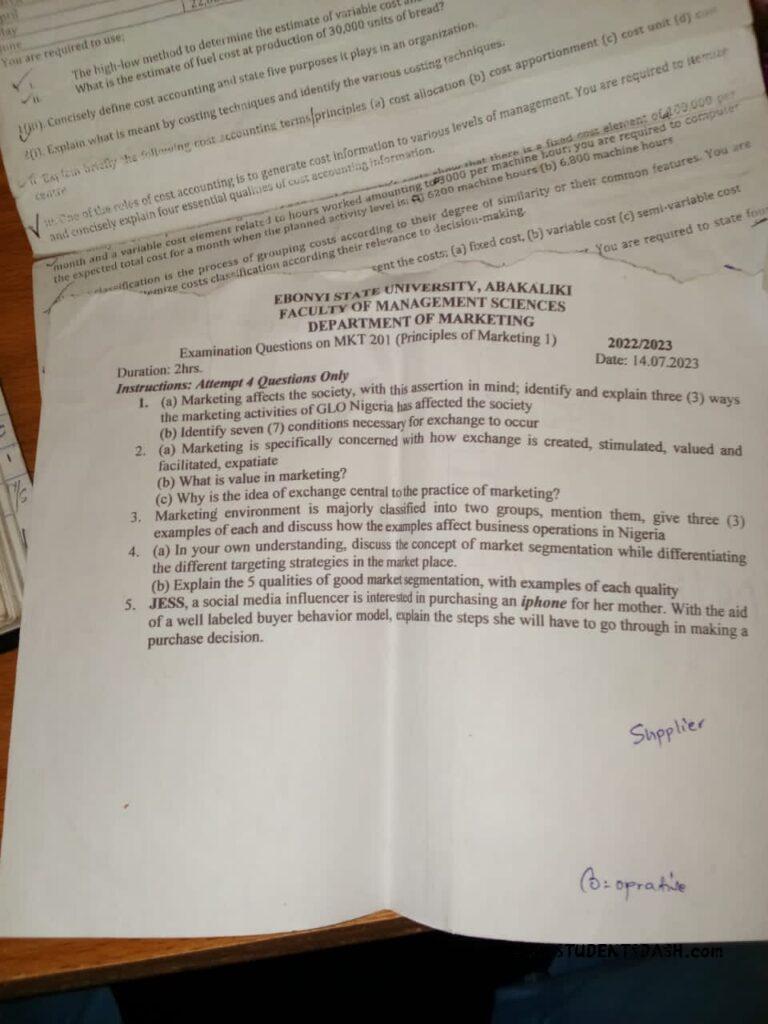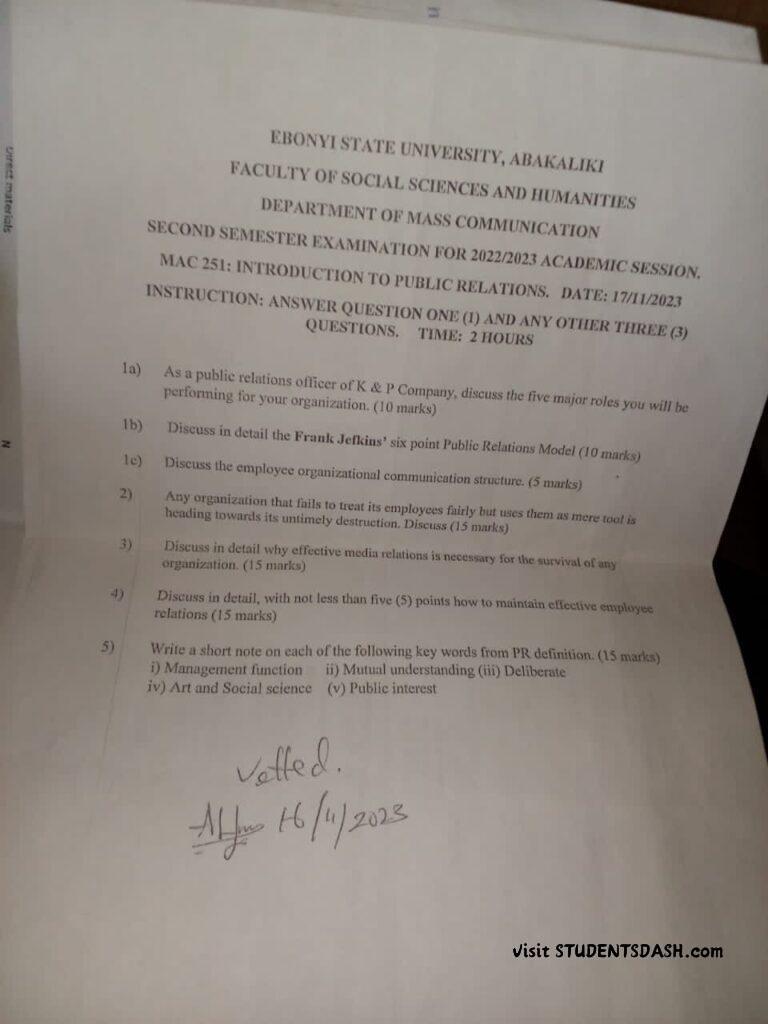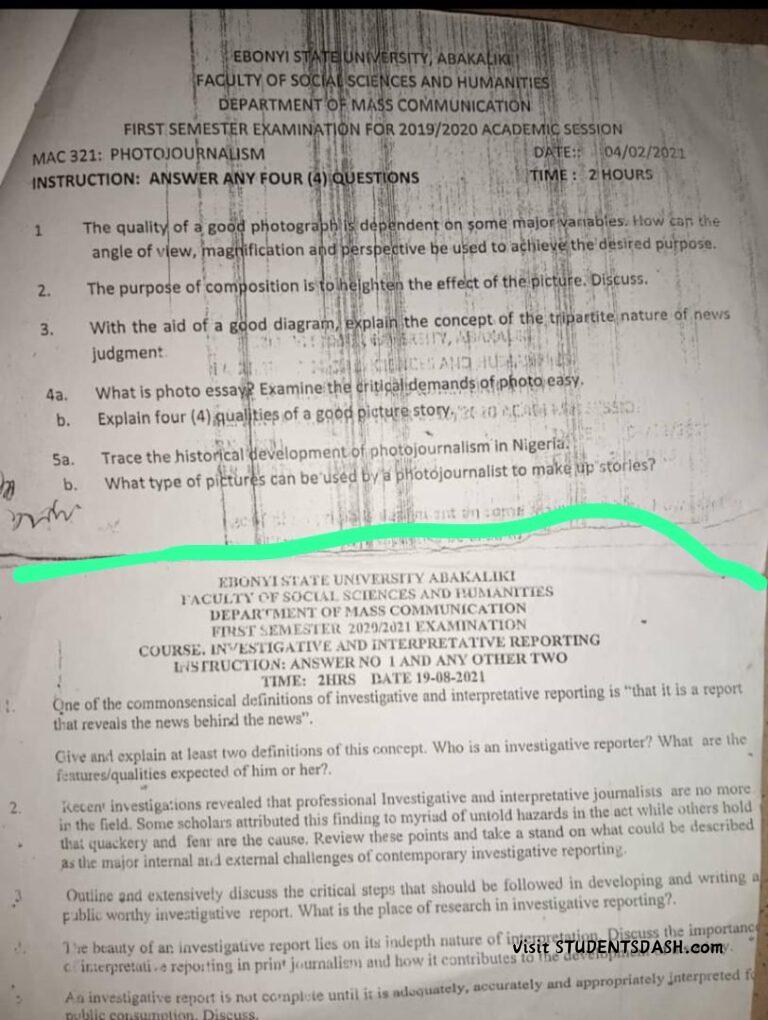GST 112 Past Questions and Answers
Study and Pass the GST 112 Exam with Studentsdash Past Questions.
Nigeria gained independence in which year?
- (a) 1957
- (b) 1960
- (c) 1963
- (d) 1970
- (e) 1980
- Answer: (b) 1960
The first Europeans to arrive in Nigeria were:
- (a) Spanish
- (b) British
- (c) Dutch
- (d) Portuguese
- (e) French
- Answer: (d) Portuguese
The 1914 Amalgamation in Nigeria was the:
- (a) Union of West African colonies
- (b) Division of Northern and Southern Nigeria
- (c) Merging of Northern and Southern Nigeria
- (d) Abolition of the slave trade
- (e) Independence of Nigeria
- Answer: (c) Merging of Northern and Southern Nigeria
Who was the Governor-General during Nigeria’s amalgamation?
- (a) Lord Lugard
- (b) Nnamdi Azikiwe
- (c) Herbert Macaulay
- (d) Obafemi Awolowo
- (e) Tafawa Balewa
- Answer: (a) Lord Lugard
The Macpherson Constitution was introduced in:
- (a) 1914
- (b) 1946
- (c) 1951
- (d) 1960
- (e) 1963
- Answer: (c) 1951
Nigeria’s current capital is:
- (a) Lagos
- (b) Ibadan
- (c) Port Harcourt
- (d) Abuja
- (e) Kano
- Answer: (d) Abuja
Traditional rulers in Nigeria are primarily responsible for:
- (a) Managing the economy
- (b) Enforcing modern laws
- (c) Preserving culture and customs
- (d) Political campaigns
- (e) Overseeing national elections
- Answer: (c) Preserving culture and customs
The Nigerian currency is called the:
- (a) Dollar
- (b) Naira
- (c) Pound
- (d) Shilling
- (e) Cedi
- Answer: (b) Naira
The major ethnic groups in Nigeria include:
- (a) Yoruba, Igbo, Hausa
- (b) Zulu, Yoruba, Igbo
- (c) Bantu, Hausa, Igbo
- (d) Fulani, Xhosa, Igbo
- (e) Shona, Yoruba, Hausa
- Answer: (a) Yoruba, Igbo, Hausa
Nigeria operates which system of government?
- (a) Monarchy
- (b) Presidential
- (c) Parliamentary
- (d) Theocracy
- (e) Military
- Answer: (b) Presidential
The Nigerian Civil War lasted from:
- (a) 1963-1965
- (b) 1967-1970
- (c) 1975-1978
- (d) 1980-1982
- (e) 1990-1993
- Answer: (b) 1967-1970
Nigeria’s first Prime Minister was:
- (a) Nnamdi Azikiwe
- (b) Tafawa Balewa
- (c) Obafemi Awolowo
- (d) Ahmadu Bello
- (e) Yakubu Gowon
- Answer: (b) Tafawa Balewa
The official language of Nigeria is:
- (a) Yoruba
- (b) Igbo
- (c) Hausa
- (d) French
- (e) English
- Answer: (e) English
Which constitution introduced the federal system in Nigeria?
- (a) Clifford Constitution
- (b) Richards Constitution
- (c) Macpherson Constitution
- (d) Lyttleton Constitution
- (e) Independence Constitution
- Answer: (d) Lyttleton Constitution
The Nigerian flag has how many colors?
- (a) 1
- (b) 2
- (c) 3
- (d) 4
- (e) 5
- Answer: (b) 2
Nigeria’s first president was:
- (a) Nnamdi Azikiwe
- (b) Tafawa Balewa
- (c) Obafemi Awolowo
- (d) Yakubu Gowon
- (e) Olusegun Obasanjo
- Answer: (a) Nnamdi Azikiwe
Which Nigerian city is known as the “Coal City”?
- (a) Lagos
- (b) Abuja
- (c) Port Harcourt
- (d) Enugu
- (e) Kano
- Answer: (d) Enugu
The Nigerian Independence Constitution was adopted in:
- (a) 1954
- (b) 1957
- (c) 1960
- (d) 1963
- (e) 1970
- Answer: (c) 1960
Nigeria’s national currency, the Naira, was introduced in:
- (a) 1960
- (b) 1963
- (c) 1973
- (d) 1980
- (e) 1990
- Answer: (c) 1973
Which country colonized Nigeria before independence?
- (a) France
- (b) Germany
- (c) Spain
- (d) Portugal
- (e) Britain
- Answer: (e) Britain
- The Nigerian coat of arms features two animals. They are:
- (a) Elephant and Lion
- (b) Camel and Horse
- (c) Lion and Horse
- (d) Horse and Eagle
- (e) Eagle and Leopard
- Answer: (d) Horse and Eagle
- Nigeria became a republic in:
- (a) 1957
- (b) 1960
- (c) 1963
- (d) 1979
- (e) 1999
- Answer: (c) 1963
- Which river flows through Nigeria and is the longest river in West Africa?
- (a) River Benue
- (b) River Senegal
- (c) River Niger
- (d) River Nile
- (e) River Congo
- Answer: (c) River Niger
- The primary function of the Nigerian National Assembly is to:
- (a) Execute laws
- (b) Interpret laws
- (c) Make laws
- (d) Manage resources
- (e) Elect the president
- Answer: (c) Make laws
- Which city is known as the “Oil City” of Nigeria?
- (a) Abuja
- (b) Lagos
- (c) Enugu
- (d) Port Harcourt
- (e) Ibadan
- Answer: (d) Port Harcourt
- The Nigerian national pledge was written by:
- (a) Wole Soyinka
- (b) Chinua Achebe
- (c) Professor Felicia Adebola Adedoyin
- (d) Nnamdi Azikiwe
- (e) Obafemi Awolowo
- Answer: (c) Professor Felicia Adebola Adedoyin
- Nigeria has how many geopolitical zones?
- (a) 3
- (b) 4
- (c) 5
- (d) 6
- (e) 7
- Answer: (d) 6
- The currency symbol for the Nigerian Naira is:
- (a) $
- (b) £
- (c) ₦
- (d) €
- (e) ¥
- Answer: (c) ₦
- Which Nigerian state is known as the “Home of Peace”?
- (a) Lagos
- (b) Kaduna
- (c) Borno
- (d) Kebbi
- (e) Plateau
- Answer: (c) Borno
- The leader of the Sokoto Caliphate was:
- (a) Oba of Benin
- (b) Ooni of Ife
- (c) Sultan of Sokoto
- (d) Emir of Kano
- (e) Alafin of Oyo
- Answer: (c) Sultan of Sokoto
- The Nigerian national anthem was adopted in:
- (a) 1960
- (b) 1978
- (c) 1980
- (d) 1990
- (e) 2000
- Answer: (b) 1978
- The official residence of the Nigerian President is called:
- (a) Dodan Barracks
- (b) Eagle Square
- (c) Aso Rock
- (d) Tafawa Balewa House
- (e) Nigeria House
- Answer: (c) Aso Rock
- The green in the Nigerian flag represents:
- (a) Unity
- (b) Peace
- (c) Agriculture
- (d) Culture
- (e) Tradition
- Answer: (c) Agriculture
- Nigeria’s motto is:
- (a) Unity and Faith
- (b) Peace and Progress
- (c) Unity and Progress
- (d) Unity, Faith, Peace, and Progress
- (e) Freedom and Justice
- Answer: (d) Unity, Faith, Peace, and Progress
- The first military coup in Nigeria took place in:
- (a) 1963
- (b) 1966
- (c) 1967
- (d) 1970
- (e) 1979
- Answer: (b) 1966
- Nigeria’s traditional system of government is largely based on:
- (a) Democracy
- (b) Theocracy
- (c) Monarchy
- (d) Oligarchy
- (e) Autocracy
- Answer: (c) Monarchy
- The first Nigerian Head of State was:
- (a) Nnamdi Azikiwe
- (b) Yakubu Gowon
- (c) Aguiyi-Ironsi
- (d) Obasanjo
- (e) Tafawa Balewa
- Answer: (c) Aguiyi-Ironsi
- The Hausa-Fulani are predominantly located in:
- (a) Southern Nigeria
- (b) Eastern Nigeria
- (c) Northern Nigeria
- (d) Western Nigeria
- (e) Central Nigeria
- Answer: (c) Northern Nigeria
- Lagos was the capital of Nigeria until:
- (a) 1976
- (b) 1980
- (c) 1985
- (d) 1991
- (e) 1999
- Answer: (d) 1991
- Nigeria’s first university is:
- (a) University of Ibadan
- (b) University of Lagos
- (c) Ahmadu Bello University
- (d) Obafemi Awolowo University
- (e) University of Nigeria
- Answer: (a) University of Ibadan
- The economic mainstay of Nigeria before oil was:
- (a) Tourism
- (b) Textile
- (c) Agriculture
- (d) Mining
- (e) Technology
- Answer: (c) Agriculture
- Who among the following was a Nigerian nationalist?
- (a) Nelson Mandela
- (b) Jomo Kenyatta
- (c) Nnamdi Azikiwe
- (d) Kwame Nkrumah
- (e) Julius Nyerere
- Answer: (c) Nnamdi Azikiwe
- The Nigerian National Petroleum Corporation (NNPC) was established in:
- (a) 1971
- (b) 1977
- (c) 1980
- (d) 1990
- (e) 2000
- Answer: (b) 1977
- Which of the following religions was introduced to Nigeria first?
- (a) Christianity
- (b) Islam
- (c) Hinduism
- (d) Buddhism
- (e) Judaism
- Answer: (b) Islam
- Who designed the Nigerian flag?
- (a) Obafemi Awolowo
- (b) Taiwo Akinkunmi
- (c) Nnamdi Azikiwe
- (d) Tafawa Balewa
- (e) Herbert Macaulay
- Answer: (b) Taiwo Akinkunmi
- Nigeria is often referred to as the “Giant of Africa” because of its:
- (a) Military strength
- (b) Population size
- (c) Rich culture
- (d) Oil wealth
- (e) Geographical size
- Answer: (b) Population size
- The primary objective of colonialism in Nigeria was:
- (a) Education
- (b) Healthcare
- (c) Exploitation of resources
- (d) Cultural exchange
- (e) Peace-building
- Answer: (c) Exploitation of resources
- The Nigerian tribe with the largest population is:
- (a) Yoruba
- (b) Igbo
- (c) Hausa-Fulani
- (d) Kanuri
- (e) Tiv
- Answer: (c) Hausa-Fulani
- Nigeria has how many official languages?
- (a) 1
- (b) 2
- (c) 3
- (d) 4
- (e) 5
- Answer: (a) 1
- Which river forms part of Nigeria’s eastern border with Cameroon?
- (a) River Niger
- (b) River Benue
- (c) River Yobe
- (d) Cross River
- (e) Sokoto River
- Answer: (d) Cross River





Lovely
Excellent Job
God bless you 🙏🏿
Thank you so much
Thanks 👍
I really enjoyed it
It was lovely nah🤞
Amazing 🥰
Wonderful
Great
Thanks so much
Thanks so much
Thanks so much